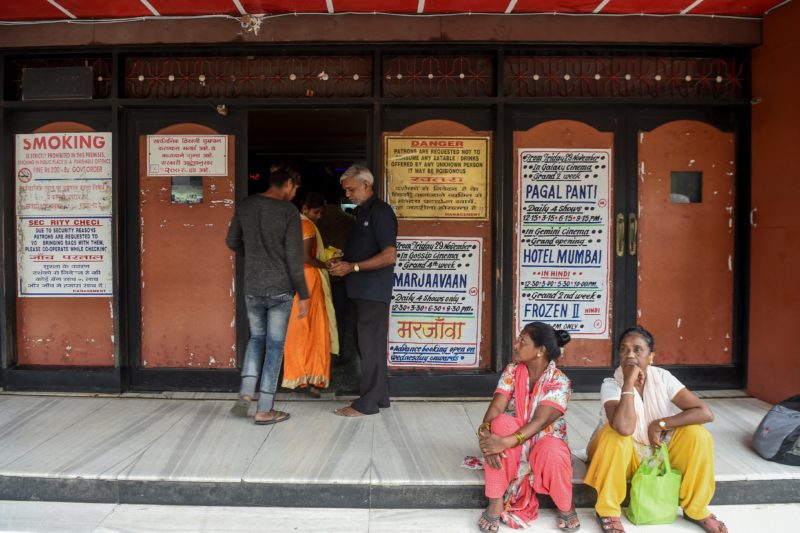As the going gets tough, Indians get going … to the movies
Even as Indians cut back on buying essential items including fruits and vegetables, movie ticket sales have only increased (Indranil MUKHERJEE)
<p>Mumbai (AFP) – As a prolonged economic slowdown forces Indians to curb spending on everything from underwear to automobiles, business in Bollywood has never been better — offering audiences an escape from the increasingly grim daily grind. </p><p>And the cash registers are likely to keep ringing, with high-profile films such as superstar Salman Khan’s "Dabangg 3" (Fearless 3) scheduled for release this week as a blockbuster season comes to a close.</p><p>Ankita Maneck will be among the millions queueing to see Khan beat up bad guys, break into song-and-dance numbers and ride off into the sunset for the customary happy ending.</p><p>In the last 12 months, Maneck lost her job, moved back home and then had to scrounge for funds to pay for her father’s surgery.</p><p>Her only respite came in the form of a movie ticket, she said, describing her cherished Friday night routine that always includes a trip to the cinema.</p><p>"The current economic situation is very frustrating," said the 29-year-old who now works as a marketing executive in the western city of Baroda.</p><p>"Watching movies is a great way to escape reality," she told AFP. </p><p>She is not the only one who thinks so. As New Delhi struggles to kickstart the limping economy, with quarterly growth recently falling to a six-year low, the movie business has been pushing ahead at full throttle.</p><p></p><p>- Escapism -</p><p></p><p>With some 1,800 releases in 2018, India is home to the world’s biggest film-making machine and Bollywood is arguably its most highest-profile star.</p><p>Despite the market entry of global video streaming players such as Netflix and Amazon Prime, the homegrown industry retains a powerful hold on the Indian imagination.</p><p>"In 2019, Bollywood has been performing exceptionally well in the last three quarters and has grown by 15 percent in comparison to last year," Mumbai-based film trade analyst Girish Johar told AFP.</p><p>The Bollywood boom even prompted a government minister to claim that India’s economic slowdown was overstated, sparking a flood of criticism.</p><p>Nevertheless, industry figures indicate that even as Indians cut back on buying essential items including fruits and vegetables, movie ticket sales have only increased.</p><p>"Films are the lowest hanging fruit for many to access entertainment without spending much during a slowdown," said Kamal Gianchandani, CEO of PVR Cinemas, the country’s largest operator of multi-screen theatres.</p><p>For the relatively affordable sum of 75 rupees ($1), a moviegoer living in India’s most expensive city Mumbai can venture to a single-screen cinema and spend three hours in air-conditioned comfort, distracted from their troubles.</p><p>Dinner at a casual restaurant costs significantly more.</p><p>In 2018/19, as India’s economy worsened, PVR’s annual earnings jumped by nearly a third to $435 million. This year is set to be even better, Gianchandani told AFP, as more and more people seek cheap escapist fare.</p><p>A similar trend appeared to be under way during the 2008 global financial crisis, when movie revenues grew as India’s economy stumbled.</p><p></p><p>- ‘Lipstick index’ -</p><p></p><p>There is no single official source for film revenues due to India’s complex distribution system covering thousands of independent exhibitors.</p><p>But figures from widely respected trade portal Box Office India show a nearly 19 percent increase in earnings between 2006 and 2009.</p><p>Conversely, when the economy picked up steam in 2014 on optimism surrounding the election of Prime Minister Narendra Modi, movie revenues actually fell to $511 million from $525 million the year before, according to the website.</p><p>The trend evokes comparisons to the oft-quoted "Lipstick Index", a term coined by Leonard Lauder, chairman of the US cosmetics giant Estee Lauder, in the early 2000s to explain why lipstick sales go up during a downturn.</p><p>The reasoning is that consumers apparently hold back on making big-ticket purchases during a slowdown and instead splurge on smaller indulgences.</p><p>With the exception of high-end multiplexes, ticket prices are very low in India compared to other markets, undercutting profits but making movies an accessible luxury for many film-crazy Indians.</p><p>For graphic designer Shruti Kulkarni, the cinema offers an opportunity to leave a cramped house and unwind. Downloading a film on her smartphone or laptop is simply not the same, she told AFP.</p><p>"There is something about watching a movie in a theatre where you are alone, yet surrounded by hundreds of strangers and sharing the same experience. I enjoy it," the 26-year-old said.</p><p></p>
Disclaimer: Validity of the above story is for 7 Days from original date of publishing. Source: AFP.


